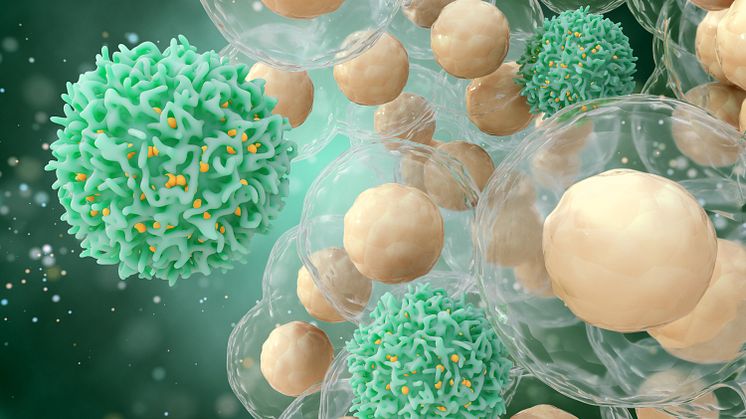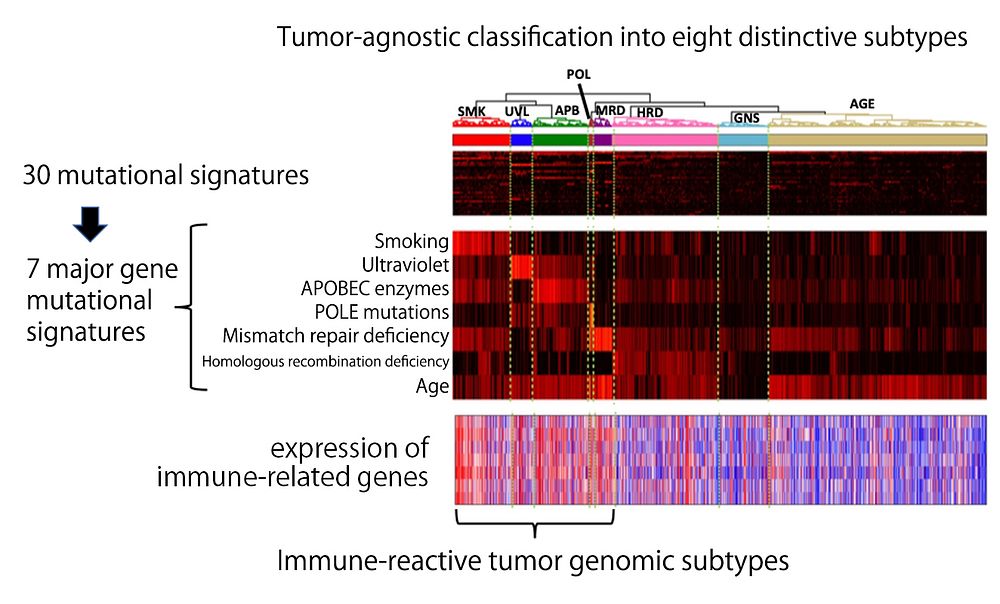
Press release -
A new program to classify solid tumors into eight genomic subtypes: Leading to predictive response analysis for cancer tumor ICI efficacy -- Kindai University
A joint research team led by Noriomi Matsumura at Kindai University (Professor, Department of Obstetrics and Gynecology, Kindai University Faculty of Medicine, Osaka, Japan) and Shiro Takamatsu (Program-Specific Assistant Professor, Department of Gynecology and Obstetrics, Kyoto University Graduate School of Medicine, Kyoto, Japan) has developed a new program "GS-PRACTICE" that analyzes the characteristics of gene mutations from DNA data of approximately 10,000 solid tumor cases to identify eight tumor genomic subtypes.
The research group also analyzed data from solid tumor cases treated with immune checkpoint inhibitors (ICIs) and proved that this classification could be used to predict the ICI efficacy.
This study was published online in the “Journal for Immuno Therapy of Cancer”, on Friday, July 22, 2022 (11:00 p.m., Japan time).
"Journal for Immuno Therapy of Cancer" is an international open access, peer reviewed journal publishing articles on all aspects of tumor immunology and cancer immunotherapy.
1. Key points
- Analyzing DNA data of approximately 10,000 cases, the team developed a new program to classify solid tumors into eight genomic subtypes
- Demonstrated that these eight classifications were significantly associated with ICI efficacy
- The results of this study will help predict response to ICI therapy on solid tumors and improve prognosis
2. Overview
In recent years,"Immune Checkpoint Inhibitors (ICIs)" treatment has been attracting attention as a promising treatment that may bring long-term therapeutic effects even for patients who do not respond to conventional anti-cancer drug treatment. This treatment enhances immunity to cancer and is highly effective in certain cancers, such as melanoma, but it is not effective in some cancer types. ICIs work particularly well on cancer cells, which have a large amount of gene mutations and a large number of markers that are easily targeted by immune cells. However, it is also known that some cancer cells respond to ICIs even though the amount of gene mutation is not very high. There is a strong need for development of methods to identify whether the cancer is ICI responsive or not before starting treatment.
The research group hypothesized that the ICIs would be influenced not only by the amount of gene mutation, but also by the cause of the gene mutation, and thus focused on the gene mutation patterns associated with ICI responses.
First, the team analyzed the patterns of gene mutations in multiple types of solid tumors of approx. 10,000 cases registered in the large cancer genomics program in the United States. Results of the analysis indicated that all solid tumors can be classified into eight subtypes. In particular, five subtypes whose genes were mutated due to external factors such as smoking and ultraviolet rays had high gene expression associated with ICI response. Using this dataset, the team also developed a program called "GS-PRACTICE" that classifies solid tumors according to their gene mutation patterns and level of immune response. With this program, 973 ICI-treated cases were classified; it verified that the classified tumor subtypes by "GS-PRACTICE" was significantly correlated with ICI efficacy.
The results of this study prove that "GS-PRACTICE" will help predict the ICI efficacy on all types of solid tumors, and is expected to be clinically used in the future.

Journal name: Journal for ImmunoTherapy of Cancer (Impact factor: 12.469 @ 2021-2022)
Research paper title: Mutation burden-orthogonal tumor genomic subtypes delineate responses to immune checkpoint therapy
Authors: Shiro Takamatsu,1 Junzo Hamanishi,1 J.B. Brown,2,3 Ken Yamaguchi,1 Koji Yamanoi,1 Kosuke Murakami,4 Osamu Gotoh5, Seiichi Mori5, Masaki Mandai,1
Noriomi Matsumura4*
*Corresponding authors
Affiliation: 1 Department of Gynecology and Obstetrics, Kyoto University Graduate School of Medicine, 2 Department of Molecular Biosciences, Kyoto University Graduate School of Medicine, 3 Center for Cancer Immunotherapy and Immunobiology, Kyoto University Graduate School of Medicine, 4 Department of Obstetrics and Gynecology, Kindai University Faculty of Medicine, 5 Project for Development of Innovative Research on Cancer Therapeutics, Cancer Precision Medicine Center, Japanese Foundation for Cancer Research


